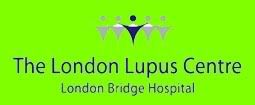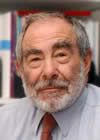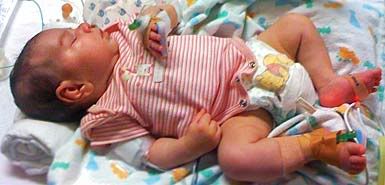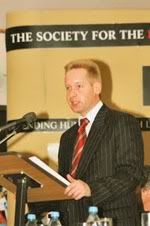 Bones stares at the grim scene lifted out of his memory by Spock's wayward brother Sybok: the young doctor reluctantly switches off his father's life support system at the latter's pleading. Now back in the present, he turns to his companions and informs them that a cure for his father's disease was discovered shortly afterwards.
Bones stares at the grim scene lifted out of his memory by Spock's wayward brother Sybok: the young doctor reluctantly switches off his father's life support system at the latter's pleading. Now back in the present, he turns to his companions and informs them that a cure for his father's disease was discovered shortly afterwards.Faith that the future will provide something we lack at present is a defining characteristic of our species. For example, this month's Reader's Dige
 st tells the story of how Professor Graham Hughes, founder of the London Lupus Centre, noticed a biochemical similarity in patients suffering from an inexplicable paralysis in Kingston Hospital, Jamaica, and patiently tracked down the cause: an antibody that attacked phospholipids on an autoimmune basis, causing a coagulation disorder, which he called antiphospholipid syndrome but has been renamed Hughes' Syndrome by the medical profession.
st tells the story of how Professor Graham Hughes, founder of the London Lupus Centre, noticed a biochemical similarity in patients suffering from an inexplicable paralysis in Kingston Hospital, Jamaica, and patiently tracked down the cause: an antibody that attacked phospholipids on an autoimmune basis, causing a coagulation disorder, which he called antiphospholipid syndrome but has been renamed Hughes' Syndrome by the medical profession. When he first presented his findings, a surgeon sitting next to him, recognising the symptoms, whispered "my first wife died of this", then both listened to the testimony of a woman who, having been the first to be diagnosed with Hughes' Syndrome and treated, had given birth to her first child after nine miscarriages.
When he first presented his findings, a surgeon sitting next to him, recognising the symptoms, whispered "my first wife died of this", then both listened to the testimony of a woman who, having been the first to be diagnosed with Hughes' Syndrome and treated, had given birth to her first child after nine miscarriages.Sometimes miracles happen: in June, six-week-old Grace Vincent continued breathing after her life-support system was switched off to let her "incurable" meningitis take its course, and she defied odds of survival that doctors had put at less than one percent.
So it's sad to see a court battle over the future of Baby RB, who was born with congenital myasthenic syndrome which, explains the Muscular Dystrophy Campaign, is "a muscle weakness that limits the movement of his limbs and his ability to breathe on his own". His father wants his life-support to remain on, and his mother wants it to be switched off on the basis that she would rather cope with a mother’s grief of losing a child than to see her son’s "intolerable suffering".
Michael Mylonas, representing the NHS Hospital Trust representing Baby RB, stated "Clinicians at the hospital are against this because in their view even with a tracheostomy, the quality of Baby RB’s life will be such that in fact he has a miserable, sad and pitiful existence". He added the following astounding statement:
His reasoning puzzles me: is there anybody who hasn't looked jealously at others' abilities and compared them to their own? Failure, misery and pain are so bound in with the human condition that the above argument does not so much rationalise extinguishing a baby's life as provide grounds for genocide.The argument before you is the fact that he has normal cognitive function and normal brain would weigh in his favour.
But the Trust is concerned that his awareness will simply make his own plight all the more unbearable - not so much now, but as he gets older and catches glimpses of what others can do.
Baby RB is unable to move his limbs but can wiggle his body to indicate, his father asserts, pleasure, and has been filmed enjoying toys. The Muscular Dystrophy Campaign said in a statement,
"Baby RB's parents find themselves in and that unfortunately the resolution of this case will inevitably be devastating for all parties involved...The Muscular Dystrophy Campaign is here to provide support for all families affected by muscle disease through our freephone information support line and care team. We also continue to invest over £1million each year into pioneering research to find treatments and cures for muscle disease."
 Its rather ambivalent stance may be due to the chairmanship of Professor Martin Bobrow, non-executive director at Cambridge's Addenbrookes Hospital, Deputy Chairman of the Nuffield Council on Bioethics and a member of the Human Genetics Advisory Commission, who has declared himself in favour of pre-implantation genetic diagnoses. This would prevent such messy court cases by preventing the birth of babies with neuromuscular disorders, and would also render the many wonderful services provided by the Muscular Dystrophy Campaign unnecessary.
Its rather ambivalent stance may be due to the chairmanship of Professor Martin Bobrow, non-executive director at Cambridge's Addenbrookes Hospital, Deputy Chairman of the Nuffield Council on Bioethics and a member of the Human Genetics Advisory Commission, who has declared himself in favour of pre-implantation genetic diagnoses. This would prevent such messy court cases by preventing the birth of babies with neuromuscular disorders, and would also render the many wonderful services provided by the Muscular Dystrophy Campaign unnecessary.I don't wish to demonise Baby RB's mother with all this, Heaven knows she must be under enough pressure as it is, for example with a marital split whose "amicable" nature may be the good cop to the trial's bad cop. But she's not being helped by doctors who predicate "a miserable, sad and pitiful existence" of a 13-month-old child. Doctors are there to perform medical and surgical interventions, not to use their eminence in order to misrepresent their opinions as facts. (I'm reminded of the case of Baby OT, whose life support was switched off this March, in spite of legal protests by both parents, by doctors who spoke of "empathy" and "distress" instead of doing medicine.)
John Smeaton, Director of the Society for the Protection of Unborn Children, quotes the society's communications manager, Anthony Ozimic, on the matter:
In fact, in a dramatic intervention, it's been announced that Baby RB's father has found a doctor willing to perform a tracheostomy on the child, but doctors have countered that this would necessitate "painful" surgery. If surgery's painful, fire the anaesthetist; I think I'd have more respect for them if they came out and honestly complained about "costly" surgery (in a research paper, Alison Davis of No Less Human refers to a British government publication that mentions that "caring for the handicapped can impose great burdens on our society").
Whenever there is doubt about life-sustaining medical treatment, everyone should act with a presumption in favour of life. The value of a person's life, and the protection due to that life, should never be judged according to opinions about the person's quality of life. An ill or disabled person's life should never be regarded as not worth living. Doctors should not confuse the possible burdens of a medical intervention with the priceless worth of a person's life.
It's not impossible that RB's condition may one day be treatable, perhaps even before the third birthday that doctors say he will struggle to reach, not stopping to think that for all of us there are times when it's a struggle to envisage getting up the following morning.
 Take Baby Z (above). The Telegraph's Bonnie Malkin reports that the newborn was cured of molybdenum cofactor deficiency, which usually kills in around three months, by a medicine Professor Günther Shwarz had been working on for 15 years. Contacted by the family, he sent his entire stock of the experimental compound.
Take Baby Z (above). The Telegraph's Bonnie Malkin reports that the newborn was cured of molybdenum cofactor deficiency, which usually kills in around three months, by a medicine Professor Günther Shwarz had been working on for 15 years. Contacted by the family, he sent his entire stock of the experimental compound.Does something like this await Baby RB, should the medical establishment suffer him to live? I don't know, but we live in hope - it's what we do.
Related post - Sympathy and distress - bad medicine for Baby OT












"I don't know, but we live in hope - it's what we do."
ReplyDeleteneeds no further comment!
Hear hear - thanks, Risa; good to see you in the draughty old fen!
ReplyDeleteThis comment has been removed by the author.
ReplyDeleteLinda, I'm looking forward to hearing from you - FD.
ReplyDelete